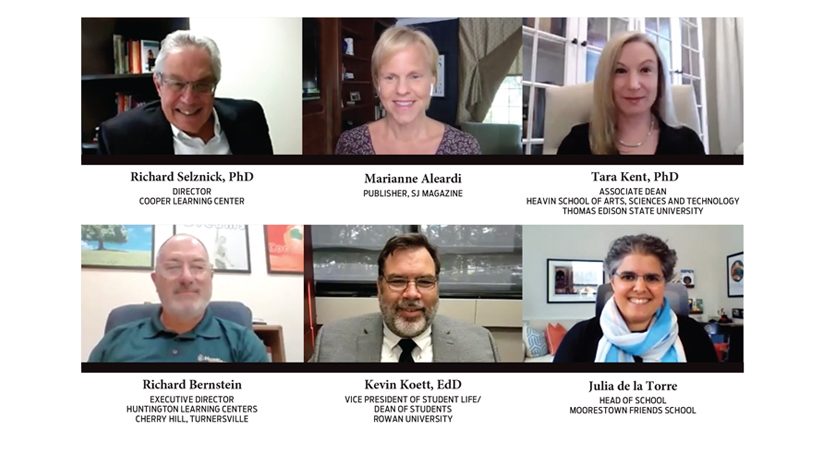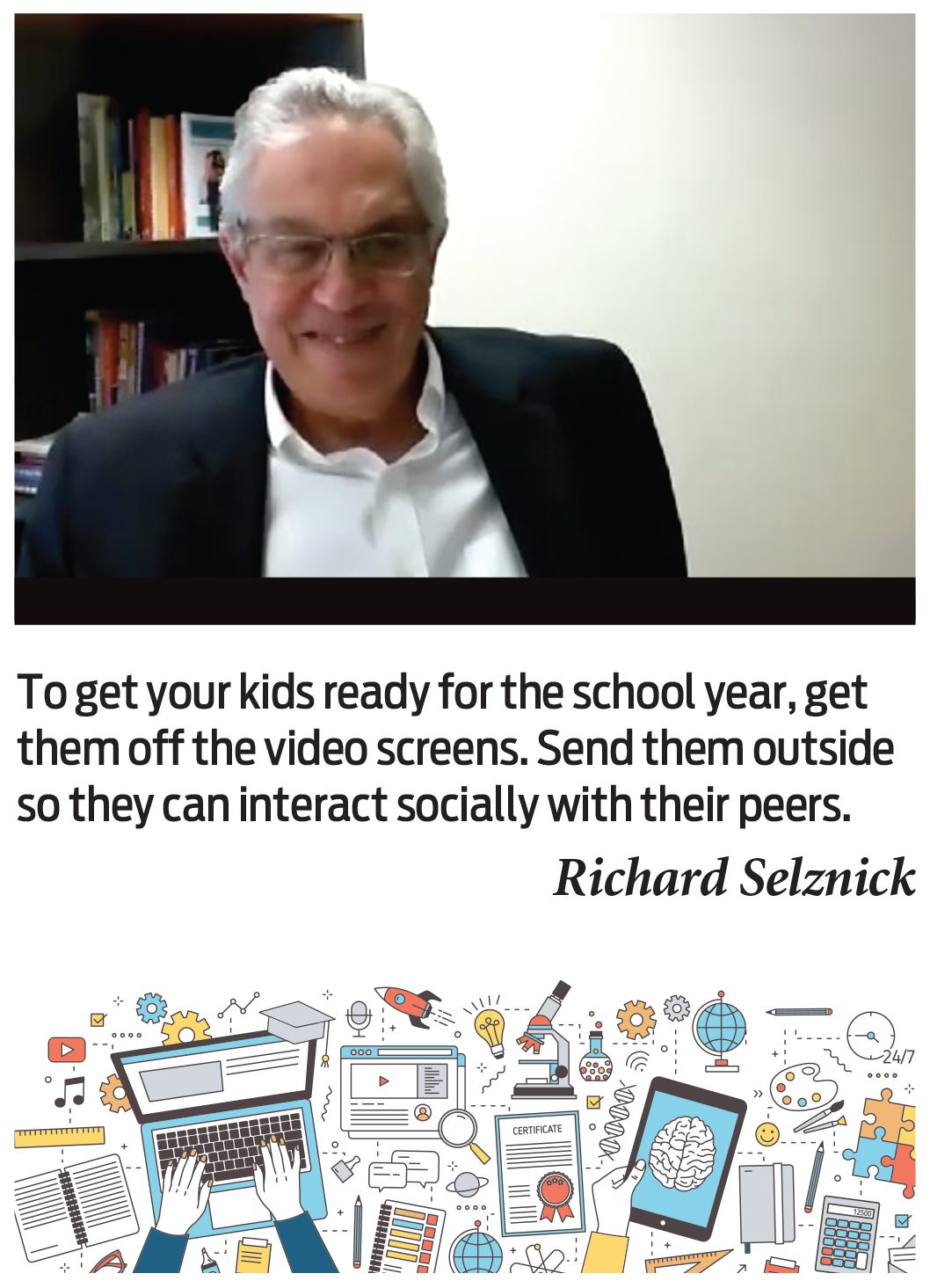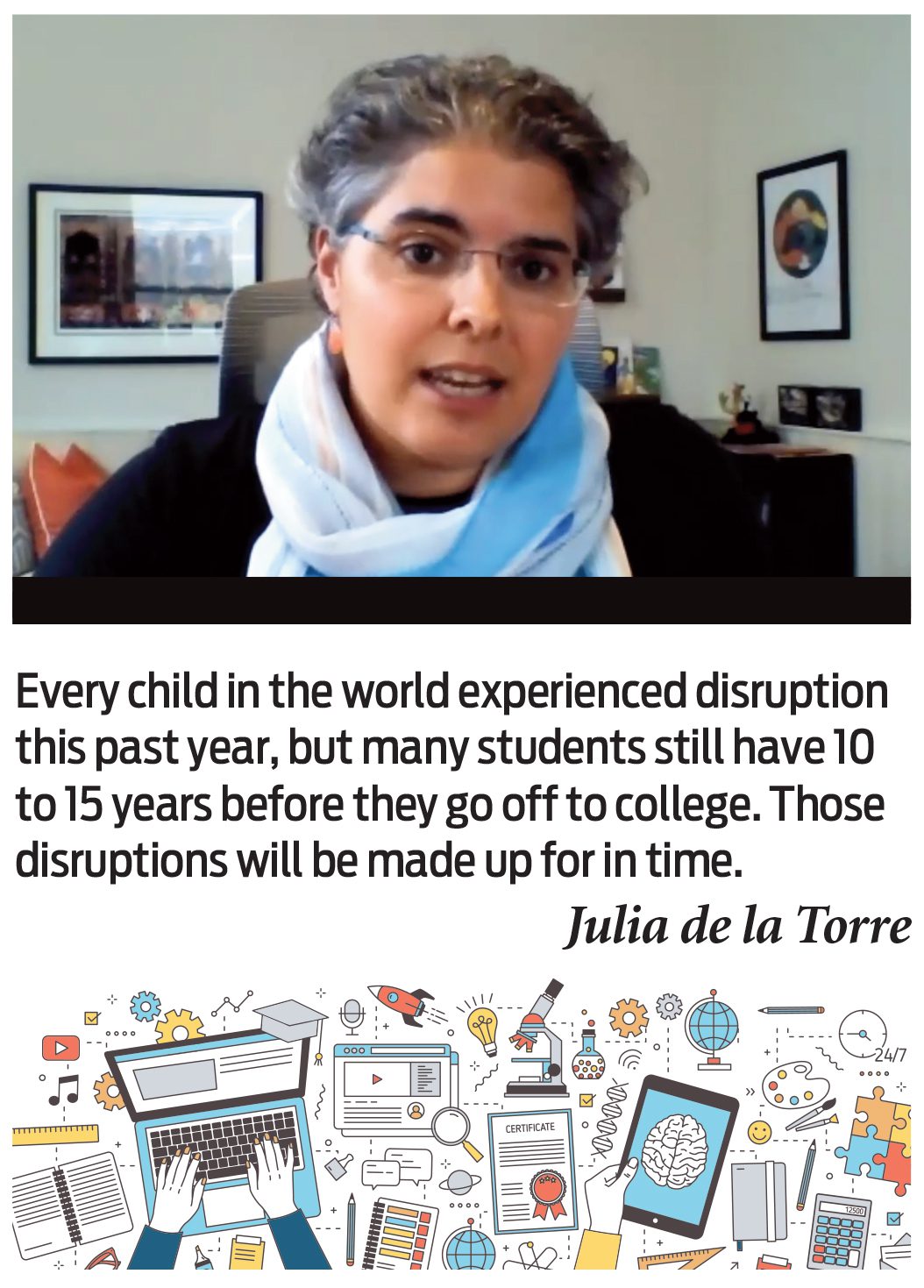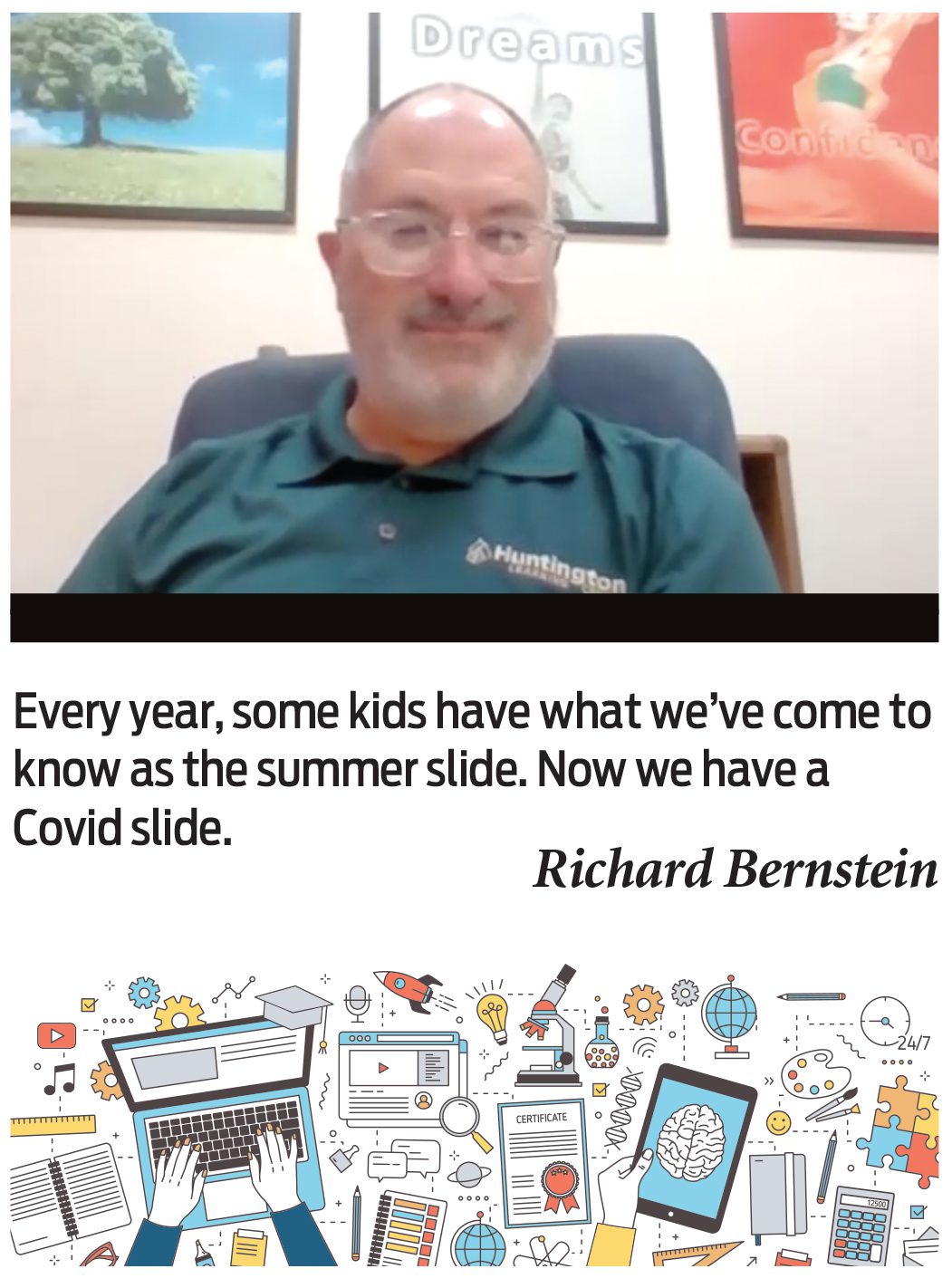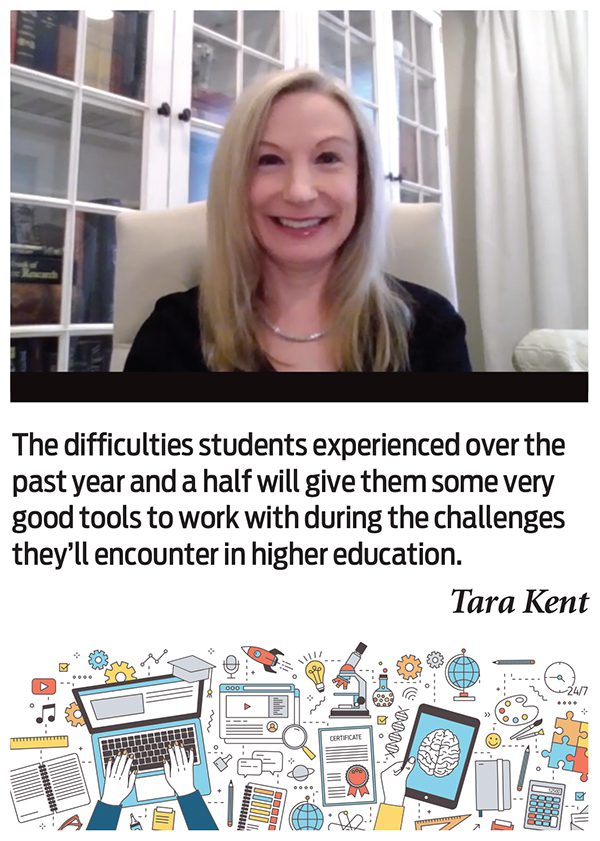
As September approaches, parents and students are gearing up for a school year that will look very different from last year and even more different from 2 years ago – when few of us really knew what a pandemic was. We asked South Jersey education experts what’s important to know and remember as the new year begins. We’re all still in a learning curve, they say, so have an open mind…and patience.
Participants:
Marianne Aleardi, Publisher, SJ Magazine
Richard Selznick, PhD, Director Cooper Learning Center
Tara Kent, PhD, Associate Dean Heavin School of Arts, Sciences and Technology Thomas Edison State University
Richard Bernstein, Executive Director Huntington Learning Centers Cherry Hill, Turnersville
Kevin Koett, EdD, Vice President of Student Life/ Dean of Students Rowan University
Julia de la Torre, Head of School Moorestown Friends School
On how the past year has affected students…
It depends very much on the student. All students learn differently, and in some respects, some students have benefitted from the experience of learning at home and being with family members, using some alternative approaches to learning. But for many students it was a tremendous challenge.
Tara Kent
You always have to look child by child, family by family. I can’t generalize. What is this family’s circumstance? How many children are there? Are there dogs flying around when the children are doing homework? How calm is the household? Does the child have some kind of attention issue? You really have to assess child by child, family by family.
Richard Selznick
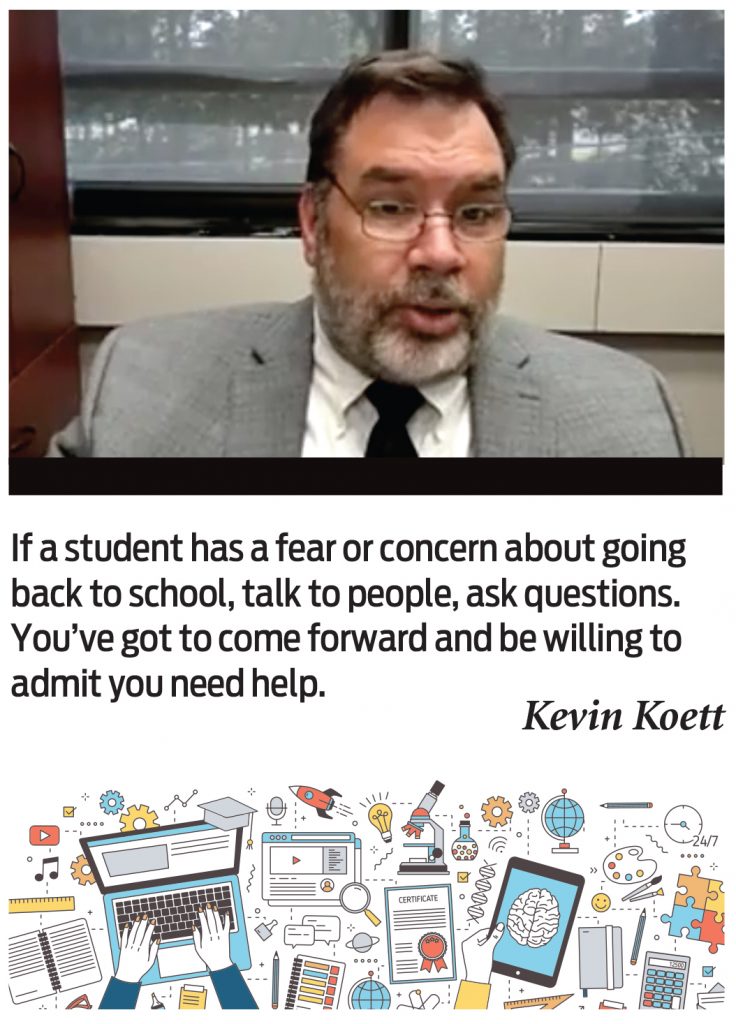
What concerns me, at the university level, is that loss of the rites of passage: first-year orientation and welcome week for freshman, internships for juniors. Students didn’t have spontaneity – that idea of I see somebody on the sidewalk and we decide we’re going to have lunch together. For younger students, you have some time to make it up, but at the college level we’re losing a little bit of that time. Those rites of passage are really important.
Kevin Koett
In K through 12, students in the lowest grades and the highest grades – the youngest kids and some of those oldest kids – had the most difficult time. The younger kids needed in-person instruction on the basics of math and writing, and learning skills like how to cooperate with others and how to do an assignment and turn it in on time. At the higher end, they had so many distractions. I remember being at a traffic intersection and seeing a couple high-school kids. I rolled down the window and said, “Aren’t you supposed to be in school?” And they said, “We are,” and held out a cell phone.
Richard Bernstein
I found the kids in lower grades had some trouble because they didn’t have those basic kindergarten/first grade experiences that lay the foundation for school development. I observed recently a classroom of 4-year-olds, and it was wild in this class. These kids did not look like they had learned what’s called self-regulation. We’re not talking about higher education issues right now, we’re talking about kids having significant tantrums and meltdowns. I’m seeing a lot of that.
Richard Selznick
Because one of our primary modalities is online learning for an adult population, our university experienced minimal disruption in its services and actually experienced an increase in enrollments. We’ve seen an increase in college attendance taking place online.
Tara Kent
On how the past year has affected parents…
This was a huge strain on families, on their at-home life and their relationship with each other. I think parents of young children in a remote setting clearly had the hardest job this past year.
Julia de la Torre
Most parents were simply saying this is hard. We literally had people who were in the restroom taking their classes, because that was the only quiet place they could find. So our conversations with faculty were about: How can we be flexible? How can we look at a new model that’s going to meet the needs of students’ specific situations, instead of having a general policy?
Kevin Koett
It was absolutely a challenge. What the university did was respond to needs as they arose. We know that attrition in college has less to do with academic preparation and more to do with all the non-cognitive factors that impact a student’s performance. We need to attend to the whole student and that includes their family, their community, their socioeconomic status. All these factors of who they are impact how they learn.
Tara Kent
Should parents worry about the upcoming school year…
I tend to think in terms of what I call the smooth-road kids who are just moving along on a smooth road. They’re not having any difficulty. Their reading and writing skills are kicking in at normal stages. Then there are kids on the rough road. Covid added a significant layer for those kids, and the next year is going to be hard for them.
Richard Selznick
There’s a lot that kids learned in terms of how to face adversity in this past year. They learned a lot about themselves that will serve them well in the long arc of their lives and the long arc of their education. So if we only worry about what may have been lost in the past year, as opposed to thinking about the long arc of education, we miss an opportunity to see what kids may have gained in this past year.
Julia de la Torre
Many parents should be worried, and the kids should be worried. A lot of kids did not get the instruction they needed. We never prepared kids to be independent learners. I saw students who were getting A’s and B’s who went to straight F’s, because they just weren’t turning their work in. While they were supposed to be on a Zoom call, they were busy on their cell phones or playing Fortnite. That doesn’t mean everybody should be worried, but there’s a large group of students who could be at risk academically this year.
Richard Bernstein
On what this next school year will be like…
At some point school is going to go back to normal, though things will be different. For example, many of the public high schools had no mid-terms and no finals. Many gave kids all kinds of leeway in terms of when to turn in assignments. At some point that will all come back, and I worry about kids being prepared. I worry that, in some cases, we are going to have to continue to ease the rules a little bit for kids, because there’s been a year and a half of not following the typical rules.
Richard Bernstein
Educators are going to be doing incredible amounts of review in the fall to bridge the 2 school years. Teachers are going to be meeting students where they are.
Julia de la Torre
There will be a challenge of interacting with people, especially someone who has a different opinion than you. It’s much different when you’re sitting next to that person versus when you’re on a computer screen.
Kevin Koett
We were in-person every day last year, but we were in such a restricted setting – all the desks were facing in one direction, and there was plexiglass around kids. It was not normal, but we were here. We didn’t eat in the cafeteria, we ate in classrooms. So I can guarantee you, even in a school where kids were in-person every single day, the first time they go to a cafeteria, which is probably one of the most socially anxious moments for a child, is going to be a difficult experience. We should be prepared for social anxiety to present itself in a very different way.
Julia de la Torre
A lot of college students have turned their cameras off and are listening to classes while they’re doing something else. We’re going to have to teach students how to be in-class students again and help them understand there is going to be that 3 hours a day where you focus on what you’re doing in class. That’s going to be a challenge for some students.
Kevin Koett
How the pandemic may permanently change the school model…
We’ve been flipping the traditional model a little bit. We all benefit tremendously when we ask in what ways we should disrupt the traditional model to really ensure that we are attending to the diverse learning needs of our students based on their social and emotional circumstances. That has to be put at the front and center at all times. The pandemic has given us this moment to really reflect on that.
Tara Kent
We had to rethink the question of how you assess progress and what we are looking to measure. We haven’t always had the freedom to ask ourselves those questions without significant challenge. Right now, everything is up in the air, so it is possible to redefine what success for students looks like, what do we want to see in terms of visible signs of progress, and is a traditional test or a mid-term the best way to do that? Or are there other ways we could discover and use going forward as institutions.
Julia de la Torre
I’ve always sensed that school – and I don’t mean this in a negative way – had a kind of hidden agenda. It was not entirely about learning. The agenda included learning to show up on time, how to get along with others. It was a basic societal agenda: sharing, using your manners at the lunch table, things like that. But I wonder how far away we’re getting from that agenda and if that matters.
Richard Selznick
On students struggling with returning to in-person school…
We have to distinguish between students for whom it is a near impossibility for them to get to school and how do we get those kids there, versus kids who may have grown very comfortable in an online environment but would benefit greatly from an in-person environment, and how do we help them successfully make that transition back.
Julia de la Torre
There are going to be some kids who are anxious about interacting with other kids, wondering if we are really past Covid. Those worries are going to be prevalent and very real. It’s human nature to feel anxiety, but when does it become more of a disorder and when is it crippling? You have to watch the behavior, try to take some notes as a parent and observe day to day. After week one, are they getting past the hurdle? How are their sleep patterns? Then bounce your observations off somebody like myself or your pediatrician and get a feel for whether it’s normal. I like parents to keep journals with little anecdotes, because for me, one story tells many.
Richard Selznick
We need to pay very close attention to what we’re hearing from the science community and to exercise caution and be well informed. Students must continue the practices of distancing and hand washing, masking in enclosed environments that have high population density. Be cautious as we proceed, knowing that we’re not quite past this and we need to be thoughtful about how we take care of ourselves.
Tara Kent
On applying for college now…
I wonder if we’re going to see an increase in transfer admission. I wonder if, as kids settle into the real experience, they find their choice doesn’t feel like them.
Julia de la Torre
There’s no question we’ve had to look at admissions differently and rely less on test scores. But I’m a huge fan of relying more on that essay and hearing students talk about what this past year was like for them, and how did they show resiliency and move through that.
Kevin Koett
In the past, a student would go visit colleges and then apply. This year, a lot of students applied and then went to visit, because the school just wasn’t open. It seems backward, but maybe that’s the way it will be.
Richard Bernstein
Colleges were reliant on a different way of evaluating kids at a time when traditional measures just couldn’t hold the same value. So the student essay and teacher recommendations were really important. I think it’s a welcomed change. The pressure kids have put on themselves to fill up their list of extracurriculars has not been a healthy pattern. Students now had an opportunity to distinguish themselves and articulate how they are responding to this unique moment in our global history.
Julia de la Torre
We will absolutely see a shift in some of the ways that colleges and universities are making admission decisions, and perhaps that will be a welcomed change. We may even see a shift in the way U.S. News and World Report ranks colleges and universities. That may also be a celebrated disruption.
Tara Kent
I worry colleges accepted students they might not otherwise have accepted, but they didn’t have the opportunity to look at a standardized measure. The standardized measure is exactly what it says it is: a standardized measure to be able to evaluate everybody on an equal playing field. I’m not sure that grades at some of the schools reflect what the student’s real potential is, whether for better or worse.
Richard Bernstein
How to prepare for the school year…
For parents of 6, 7 and 8 year olds, think about what skills you need to target. Is the child an adequate reader? Then you don’t need to target reading skills. But if your child looks a little puzzled when you ask an inferential question, then that’s a skill to target. It’s somewhat like if you had a tennis player – are we targeting forehand, backhand, the serve? What area of need do you think this child has? Find ways to target that.
Richard Selznick
I urge parents to resist the temptation to fill their child’s schedule with structured activities. It is tempting to think about what they may have lost and fill it in, but the reality is their teachers are ready for them and all their gaps when they come in the fall. What teachers will not be able to provide is unstructured time and an opportunity to connect with peers so they can re-establish their support system.
Julia de la Torre
Students will benefit from developing skills to self-monitor, self-regulate and to very specifically articulate when they have a need in any educational environment. They need to develop that sense of self-advocacy, and it’s our responsibility as education professionals to be highly responsive to that.
Tara Kent
Some things that will help students perform better once they get back into a classroom are having them read every week and also do some math problems.
Richard Bernstein
On students’ mental health…
We’re hiring 3 new positions to pay attention to students’ mental health needs. We’re relying on faculty to say, “Hey, Ann isn’t acting the same way in my class,” or our residence life staff will say, “Tom isn’t as engaged in the residence halls.” We’re making sure there are people in place to tie those notes together who have the resources to connect with the student and say, “We care about you. Let’s have a conversation.”
Kevin Koett
The CDC is saying that about 40% of adults reported mental health challenges in response to Covid. And we already know that Gen-Z has at least an 11% increase from the generation before them in dealing with mental health challenges. So as educators, we are absolutely in a position where we must respond to those needs of this entire generation of students.
Tara Kent
Some kids may present as if nothing has happened and everything is fine, and we may see the impacts much later. All of us as educators are going to be waiting to see, what are the long-term impacts of this moment, not just on kids but also on adults.
Julia de la Torre
Watch a variety of video clips from the discussion here.


